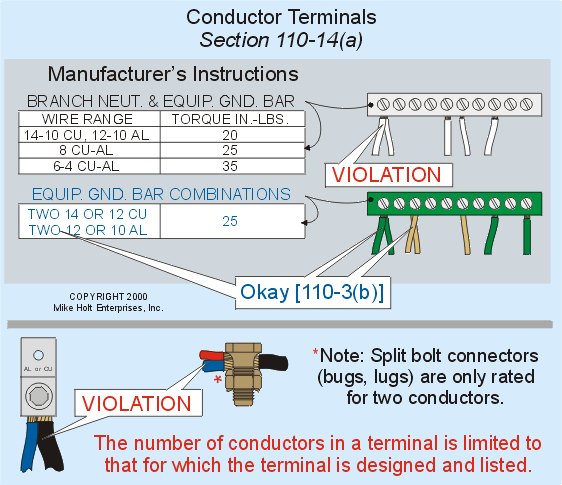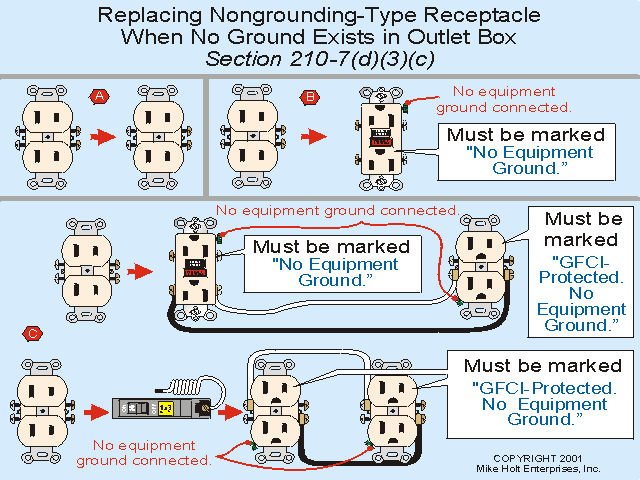|
FREQUENTLY ASKED QUESTIONS
What does an electrical
inspection agency do? What is an underwriter's
certificate?
How can
I schedule an Inspection?
Where is arc
fault protection required residentially?
Are smoke
detectors required in a bedroom? Where should the smoke
detector be placed?
Two Wires Under a
Single Terminal...can you see the violation?
Replacing
Nongrounding-Type Receptacles....can you see the
violation?
What does
and electrical inspection agency do?
back to top
The electrical inspection agencies are
all private companies hired by an electrician or
homeowner that performs electrical inspections. An
electrician cannot perform electrical inspections; it
has to go through an electrical inspection agency for
several reasons.
1. The electrical inspection agency has
to maintain a higher level of liability insurance in
case something happens that most electricians do not and
will not carry.
2. The towns have to give approval for
the agency to perform inspections in the area. The
agency seeks approval through the building department,
once the chief building inspector reviews the
application it goes to the town board for their
approval.
3. Inspectors are continually going to
school in order to interpret the National Electrical
Code in order for people to understand the meaning and
the intent of the code.
4. At NYS Electrical Inspections
Inc.
our inspectors do not perform actual work,
electrical, or side
jobs.
How do
I Schedule an Inspection with NYS Electrical
Inspections?
back to top
Order your inspection online
Fill out the form by hand and mail or fax it to NYS
Electrical Inspections:
Download
In Microsoft Word Format
Download
In PDF Format
Where is Arc
Fault required residentially?
back to top
210.12 Arc-
Fault Circuit-Interrupter Protection.
(A) Definition: Arc- Fault Circuit-Interrupter
Protection (AFCI). A device intended to provide
protection from the effects of arc faults by recognizing
characteristics unique to arcing and by functioning to
de-energize the circuit when an arc fault is detected.
2014
National Electrical code NFPA 70 210.12 requires the
following areas to have arc fault protection: all 15 and
20 ampere branch circuits supplying outlets installed in
dwelling units.
- family room
- kitchen
- laundry areas
- dining rooms
- living rooms
- parlors
- libraries
- dens
- bedrooms
- sunrooms
- recreation rooms
- closets
- hallways
- or similar rooms or areas
This includes the lights, outlets, and smoke detectors
Area that donít require arc fault protection:
- bathrooms
- outdoors
- unfinished basements
-----------------------------------------------------------------------------------------------------------
Are Smoke
Detectors Required in a Bedroom?
back to top
Every
bedroom requires one smoke detector inside the room and
a smoke detector out side of the bedroom hardwired
interconnected. What the term hardwire means is that all
the smoke detectors are connected to an electrical power
source. To interconnect them it must be connected with a
3- wire, so that when one smoke detector sounds off they
all go off. The smoke detector located outside of the
bedroom can fulfill the requirement for several bedrooms
unless the hallway is over 40 feet in length than
install a second smoke detector one on each end. The
smoke detector must be 3 feet from any fan (edge of
blades), vent, or ac return.
Locations
smoke detectors are required:
- one on each floor of house including basement.
- one in each bedroom.
- one located outside of a bedroom.
Recommended
locations to avoid:
- garages
- kitchens
- near furnaces and gas hot water heaters
- near vents, heating or cooling returns, and fans (edge
of blades)
- attics
- dusty areas
- fluorescent lights
Carbon
monoxide detectors are needed on every floor with a
bedroom or inside a bedroom with a fuel fired appliance
(ex. fireplace) and the basement when a fuel fired
appliance (ex oil burner, gas hot water) are located. A
combo smoke/carbon detector can be used on all floors.
back
to top

back
to top

NYS
Electrical Inspections
278 Indian Head Rd
Kings Park, NY 11754
T: (631) 466-4235
F: (631) 460-9192
|